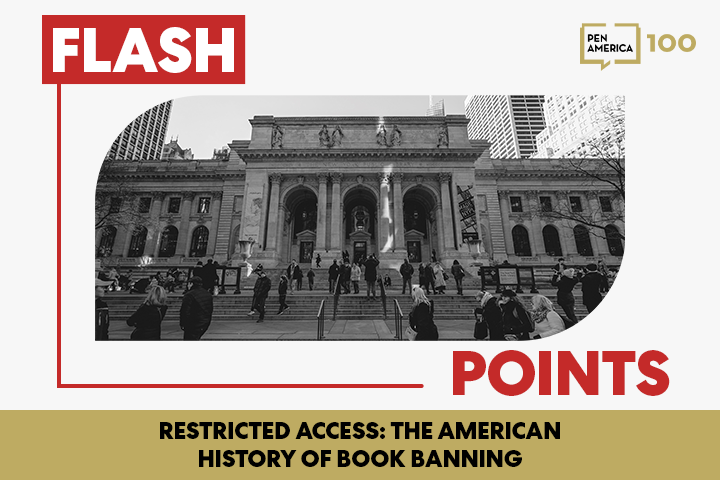Restricted Access: The American History of Book Banning

Censorship and book bans are nothing new in American life. In the 19th century, it was the federal Comstock laws barring the delivery and distribution of “every obscene, lewd, or lascivious” book. Today, books that highlight race, gender, or sexuality are being yanked from public shelves around the country. This humanities discussion explores the history of book banning and obscenity laws in the United States.
DOWNLOAD OUR DISCUSSION GUIDE AS A PDF
Video Highlights
- 10:31 Listen to André De Shields read an excerpt from Nobel laureate Toni Morrison’s Pulitzer Prize-winning novel Beloved.
- 21:30 Listen to moderator Ali Velshi discuss why the effort to fight book bans is fundamentally about defending democracy.
- 26:05 Listen to Amy Werbel discuss the censorship efforts of Anthony Comstock in the early 1900s and the resistance to them led by figures such as Margaret Sanger.
- 34:45 Listen to Farah Jasmine Griffin discuss the banning of Toni Morrison’s books and Morrison’s long history of anti-censorship work.
- 41:24 Listen to Whitney Strub discuss book bans of LGBTQ books and how queerphobic bias has shaped the history of obscenity law.
- 51:23 Listen to Laurie Halse Anderson discuss writing stories that her teen readers can relate to as they deal with their confusing stage of life, and how censorship efforts have gotten worse in more recent years.
- 57:10 Listen to Strub and Anderson answer a question about the necessity of age-appropriate sex education in literature and the responsibility adults have to provide access to this education.
How does censorship in America relate to public’s social and moral values? The short video below explains how today’s book bans were preceded by over a century’s worth of obscenity laws and bans.
Contributing Scholars
Ali Velshi is the host of “Velshi” on MSNBC, He is also a Business Correspondent for NBC News, a columnist for MSNBC, and a weekly economics contributor to NPR’s “Here And Now.”
Laurie Halse Anderson is a New York Times-bestselling author known for tackling tough subjects with humor and sensitivity. Two of her books, Speak and Chains, were National Book Award finalists.
Farah Jasmine Griffin is the William B. Ransford Professor of English and Comparative Literature and African American Studies at Columbia University, where she also served as the inaugural Chair of the African American and African Diaspora Studies.
Whitney Strub is an Associate Professor of History at Rutgers University-Newark and co-editor of Porno Chic and the Sex Wars: American Sexual Representation in the 1970s (University of Massachusetts Press, 2016).
Amy Werbel is a Professor and Acting Chair in the Art History and Museum Professions at the Fashion Institute of Technology. She is the author of numerous works on the subject of American visual culture and sexuality.
From the PEN archives
- “48th PEN International Congress – Censorship in the USA” with Margaret Atwood, Robert Bernstein, Rose Styron, Gay Talese, Charles Rembar, Barbara Parker, Kurt Vonnegut (1986)
- “A Case of Libel” with Oren Lyons, Peter Matthiessen, Martin Garbus, Mary Morris (1986)
- “Red, White and Censored” symposium with Allen Ginsberg, Judy Blume, & Amy Tan (1989)
- “Evenings of Forbidden Books” with June Jordan, Andre Gregory, Toni Morrison, Calvin Trillin, Jamake Highwater, Erica Jong, John Irving, Anthony Burgess & more (1982, 1983)
- “American Right to Read Colloquium” on banning books like Slaughterhouse-Five (1983)
- “Roy Blount, Jackson MS”; Roy Blount Jr. shares his view on the importance of the First Amendment, specifically in regards to the issue of book banning.
Primary Sources
- Documentation of a recent attempt to ban numerous books in Florida, including many LGBTQ books
- Article about a recent book ban of one of Toni Morrison’s novels
For a Deeper Dive
Today, books in the US are under profound attack. They are disappearing from library shelves, being challenged in droves, being decreed off limits by school boards, legislators, and prison authorities. And everywhere, it is the books that have long fought for a place on the shelf that are being targeted. Books by authors of color, by LGBTQ+ authors, by women. Books about racism, sexuality, gender, history. PEN America pushes back against the banning of books and the intolerance, exclusion, and censorship which undergirds it.
PEN America tracks book bans in libraries and classrooms across America in our Index of School Book Bans, updated weekly.
